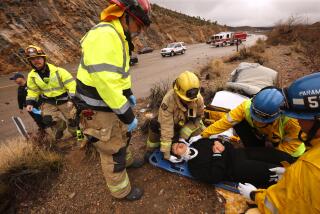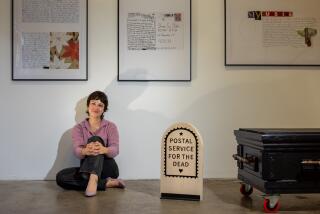A Job to Dread : Point Mugu: Because of the Gulf War, nearly 100 sailors have been trained to notify relatives of military deaths.
He is the messenger of death--the person who turns up on the doorstep in a neatly pressed military uniform with the grave news.
Navy Lt. Cmdr. Richard Cummings dreads the job. It is never easy to tell the family of a military man or woman that their loved one has been killed.
“I never know quite what I’m going to say,” Cummings said. So he takes a deep breath and rings the doorbell. “As soon as they see me, they usually know.”
Until recently Cummings was one of a small group of casualty assistance officers at the Naval base at Point Mugu that made an average of 10 death notifications a year. But in the past two weeks, that has changed.
Because of the war in the Persian Gulf, officials at Point Mugu have trained nearly 100 sailors to notify families in Ventura and Santa Barbara counties of deaths, as well as how to help the families through the following months.
Although the number of casualty assistance officers may seem high, program manager Johnny Howard said he wants to make sure the base is prepared.
“We don’t want to keep people waiting,” Howard said, especially when there’s a good chance that families will learn of war fatalities almost instantly from the news. Because of that, messengers are on call 24 hours a day. The base has not had to make any notifications since Operation Desert Storm started.
Cummings, who works as an F-14 pilot at the base, said he has been bringing his formal uniform to work every day. He waits and wonders when he will be asked to make a call.
He knew when he volunteered for the messenger duty two years ago that the job wasn’t going to be easy. But since he is not with many of his friends who had been sent on missions overseas, he felt this was a small way he could help his compatriots. So far he has made two notifications, both unrelated to the Persian Gulf War.
“If I can’t be with my buds, maybe I can be back here helping out,” he said. “That’s the way I’d want it to be if I were there in Iraq. I would want someone who takes the job seriously to take care of my family if I were to fall in combat.”
When Cummings is assigned to a family, it takes priority over his other duties. Sometimes casualty officers work with survivors for up to a year.
The process begins when Cummings, with a chaplain at his side, delivers the grim news on “behalf of the Secretary of the Navy.”
“The notification is the most upsetting and difficult part,” he said. “After that is over, that’s when the real work begins--helping families get through the process and helping them understand their options.”
Cummings will assist with funeral arrangements. He tells families about their benefits and helps them cut through government red tape.
“There’s a lot of paperwork to be done,” he said. And the details--such as who to contact at the Veterans Administration or what counseling services are available--can further complicate the lives of survivors.
“I can do the legwork for them,” he said. “I can find the answers to their questions. It makes it easier for them, and that’s what we’re here for.”
But sometimes, Cummings said, it is difficult for him to answer a question families ask most: What happened?
When he is first told about a death, he is only given a small amount of information to relay to the relatives.
“Usually we just get a brief message, maybe with one line on the circumstances,” Cummings said. “When we talk to the family, they want to know so much more. In one case, the family really thought I was holding back information. They tried to hold out hope, maybe he (their son) wasn’t dead. Maybe he was just hurt.”
That’s why casualty officers are instructed to use the word “death,” Cummings said.
“You’ve got to be very direct,” he said. “Denial is a big part of the grief.”
And while the messengers are expected to be blunt, they also are compassionate. Cummings, who has a wife and three young sons, says he can understand how upsetting it must be to lose a loved one.
He said he does his best to explain to families that information will come trickling in. He gives them his home number and constantly checks in with headquarters to see if additional information is available.
He’ll return to the family’s home a day later, to see how they are doing. If he sees that they need emotional support, he’ll contact their friends or other family members or put them in touch with counselors.
He said he has noticed that families receive some solace in knowing their loved ones died for their country.
“It helps them to know that their son or their husband did not die in vain,” Cummings said.
Because of that, he said he goes out of his way to make sure medals, uniforms and other personal effects are returned to the families.
“I treat the families exactly how I would want my family to be treated,” he said. “As painful as this whole notification visit is, I’m here to help them get through it and get on with their lives.”
More to Read
Sign up for Essential California
The most important California stories and recommendations in your inbox every morning.
You may occasionally receive promotional content from the Los Angeles Times.









